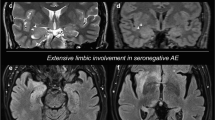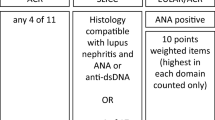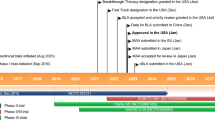Summary
Using a C1q binding test, circulating immune complexes (IC) were detected in 33.3% of sera from 138 patients and in 19.4% of 124 spinal fluid samles from patients with multiple sclerosis. Most often they occur in sera alone. As a rule their detectable amount is small in sera as well as in spinal fluids. IC were observed with equal frequency during acute exacerbations and in stable phases of the disease. In patients with early MS of less than 3 months duration, IC were detected only rarely, whereas their frequency increased up to 50% in patients with longer standing disease. Immunosuppressive therapy has no influence on IC formation. Patients with immune complexes exhibited a more rapid clinical deterioration if compared as a group with IC-negativ ones. No correlations were found between immune complex formation and the CSF-IgG index or the rate of pleocytosis in spinal fluids. Neither the complement factors C3, C4, C3A nor total hemolytic complement activities (CH 50) in serum were significantly decreased in patients with IC formation in serum as compared with the IC-negative group. The results demonstrate that IC formation probably is of no importance in the pathogenesis of multiple sclerosis.
Zusammenfassung
Zirkulierende Immunkomplexe ließen sich mit Hilfe des C1q-Bindungstestes bei 33,3% von 138 Multiple-Sklerose-Kranken im Serum und bei 19,4% von 124 Multiple-Sklerose-Kranken im Liquor nachweisen. Sie traten zumeist im Serum allein auf. Ihre nachweisbare Menge war sowohl im Serum als auch im Liquor häufig nur gering.
Sie traten in akuten Stadien der Erkrankung ebenso häufig auf wie in relativ stabilen Phasen. Bei frisch Erkrankten mit einer Krankheitsdauer von maximal 3 Monaten sind sie sehr selten. Bei längerer Krankheitsdauer lassen sie sich dann bei 40–50% der erkrankten Personen nachweisen, auch noch nach jahre- oder jahrzehntelangem Verlauf. Bei einer zweijährigen Verlaufsbeobachtung zeigte sich, daß bei Personen mit zirkulierenden Immunkomplexen die Multiple Sklerose rascher fortschreitet. Eine immunsuppressive Behandlung ist ohne Einfluß auf die Bildung der Immunkomplexe. Ihre Entstehung ist auch unabhängig von der Immunglobulin G-Erhöhung im Liquor und dem Ausmaß der Pleozytose. Eine Verminderung einzelner Komplementfraktionen (CH 50, C3, C4, C3A) war bei Personen mit zirkulierenden Immunkomplexen nicht festzustellen.
Die Untersuchung macht deutlich, daß Immunkomplexe wahrscheinlich keine entscheidende Rolle in der Pathogenese der Multiplen Sklerose spielen.
Similar content being viewed by others
References
Bammer, H.: Liquor Komplement und Multiple Sklerose. Dtsch. Z. Nervenheilk. 188, 271–288 (1966)
Bertrams, J., Opferkuch, W., Grosse-Wilde, H., Luboldt, W., Schuppien, W., Kuwert, E.: C2 hypocomplementaemia in multiple sclerosis. Lancet 1976 II, 1358–1359
Caputo, D., Bisaccia, G., Sabbadimi, M. G., Zibetti, A.: HLA-A3 linked C3 deficiency in multiple sclerosis. Boll. Ist. Sieroter. Milan. 56, 260–263 (1977)
Davous, P., Jacque, C. M., Grangeot-Keros, L., Marteau, R., Baumann, N.: Circulating immune complexes in multiple sclerosis. Relation to clinical and biological parameters. Biomedicine (Express) 29, 103–106 (1978)
Delpech, B., Lichtblau, E.: Etude quantitative des immunoglobulines G et de l'albumine du liquide céphalorachidien. Clin. chem. Acta 37, 15–23 (1972)
Deicher, H., Meyer zu Schwabedissen, H., Liman, W., Baruth, B., Patzold, U., Haller, P.: Immune complexes in cerebrospinal fluid and serum of patients with multiple sclerosis. In: Progress in MS research, H. J. Bauer (ed.). Berlin, Heidelberg, New York: Springer (in press)
Dube, V. E., Mc Duffie, F. C., Burton, R. C., Ilstrup, D.: Cerebrospinal fluid complement in multiple sclerosis. J. Lab. clin. Med. 81, 530–537 (1973)
Geraud, G., Boissezon, J. F. de, Castel, M., Bes, A., Geraud, J.: Serum-complement in multiple sclerosis. Lancet 1977 II, 1177
Goust, J. M., Chenais, F., Carnes, J. F., Hames, C. G., Fudenberg, H. H., Hogan, E. L.: Abnormal T-cell subpopulations and circulating immune complexes in the Guillain-Barré syndrome and multiple sclerosis. Neurology (Minneap.) 28, 421–425 (1978)
Howes, E. L., Mc Kay, D. G.: Comparison of the ocular effects of the circulating endotoxin and immune complexes: Role of vasoactive amines. J. Immunol. 114, 734–737 (1975)
Jacque, C., Davous, P., Baumann, N.: Circulating immune complexes and multiple sclerosis. Lancet 1977 II, 408
Jersild, C.: The occurrence of immune complexes in patients with MS. In: Progress in MS research, H. J. Bauer (ed.). Berlin, Heidelberg, New York: Springer (in press)
Kuwert, E., Noll, K., Firnhaber, W.: Komplementsystem und Liquor cerebrospinalis. III. Das Verhalten von Gesamt-C und C1–C4 in Serum und Liquor von Patienten mit Multipler Sklerose. Z. Immunitätsforschung 135, 462–480 (1968)
Lumsden, C. E.: The immunogenesis of the multiple sclerosis plaque. Brain Res. 28, 365–390 (1971)
Lurhuma, A. Z., Cambasio, C. L., Masson, P. L., Hermans, J. F.: Detection of circulating antigen-antibody complexes by their inhibitory effect on the agglutination of IgG-coated particles by rheumatoid factor or C1q. Clin. exp. Immunol. 25, 212–226 (1976)
Mayer, M. M.: Complement and complement fixation. In: Experimental Immunochemistry, E. A. Kabat, M. M. Mayer (eds.), pp. 133 ff. Springfield, Ill.: Thomas 1961
Nydegger, U. E., Lambert, P. H., Gerber, H., Mischer, P. A.: Circulating immune complexes in the serum in systemic lupus erythematosus and in carriers of hepatitis B antigen. Quantitation by binding to radiolabeled C1q. J. Clin. Invest. 54, 297–309 (1974)
Oldstone, M. B. A., Wilson, C. B., Perrin, I. H., Norris, F. H. Jr.: Evidence for immune complex formation in patients with amyotrophic lateral sclerosis. Lancet 1976 II, 169–172
Oldstone, M. B. A., Theofilopoulos, A. N., Gunvén, P., Klein, G.: Immune complexes associated with neoplasia: Presence of Epstein-Barr virus antigen-antibody complexes in Burkitts' lymphoma. Intervirology 4, 292–302 (1974)
Patzold, U., Weinrich, W.: Vorschlag einer neurologischen Befunddokumentation mittels Markierungsbeleg. Nervenarzt 46, 550–556 (1975)
Patzold, U., Haller, P., Haas, J., Pocklington, P., Deicher, H.: Therapie der Multiplen Sklerose mit Levamisol und Azathioprin. Vergleich der Wirksamkeit einer „immunstimulierenden“ und „immunsuppressiven“ Behandlung. Nervenarzt 49, 285–294 (1978)
Patzold, U., Haller, P., Trostdorf, D., Pocklington, P., Deicher, H.: Azathioprine in multiple sclerosis. A controlled prospective study. In: Progress in MS research, H. J. Bauer (ed.). Berlin, Heidelberg, New York: Springer (in press)
Powis, Ph. A., Cuzner, M. L., Davison, A. N.: Serum immune complexes in multiple sclerosis. Biochem. Soc. Trans. 5, 1420–1422 (1977)
Ringelmann, R., Opferkuch, W., Röllinghoff, M., Loos, M.: Complement-Messungen mit Hilfe des Mikrolitersystems. Z. med. Mikrobiol. u. Immunol. 154, 329 (1969)
Tachovsky, T. G., Koprowski, H., Lisak, R. P., Theofilopoulos, A. N., Dixon, F. J.: Circulation immune complexes in multiple sclerosis and other neurological diseases. Lancet 1976 II, 997–999
Tavolato, B. F.: Immunoglobuline G distribution in multiple sclerosis brain. J. Neurol. Science 24, 1–11 (1975)
Theofilopoulos, A. N., Wilson, C. B., Dixon, F. J.: The Raji cell radioimmune assay for detecting immune complexes in human sera. J. clin. Invest. 57, 169–182 (1976)
Tourtelotte, W. W., Parker, J. A.: Multiple sclerosis: Correlation between immunoglobulin G in cerebrospinal fluid and brain. Science 154, 1044–1046 (1966)
Tourtelotte, W. W., Parker, J. A.: Multiple sclerosis: Brain immunoglobuline G and albumine. Nature 214, 683–686 (1967)
Tourtelotte, W. W., Kokmen, E., Tavolato, B., Kruger, P. S.: Fluorescent cell tracing in multiple sclerosis brain tissue. Trans. Am. Neurol. Assoc. 96, 318–320 (1971)
Trouillas, P., Moindrot, J., Betuel, H., Quincy, Cl., Aimard, G., Devic, M.: Scléroses en plaques avec hypocomplémentémie et scléroses en plaques normocomplémentaires. Correlations cliniques et génétiques. Rev. Neurol. (Paris) 132, 681–704 (1976)
Whitaker, J. N., Dowling, P. C., Cook, S. D. J.: Immunofluorescent studies of the kidney in human neurologic disorders. Neuropath. exp. Neurol. 30, 129–190 (1971)
Wilson, C. B., Dixon, F. J.: Immunpathologic mechanisms of renal disease. Ric. Clin. Lab. 5, 17–38 (1975)
World Health Organisation Technical Report Series: The role of immune complexes in disease. 606, Geneva 1977
Woyciechowska, J. L., Brzosko, W. J.: Immunofluorescence study of brain plaques from two patients with multiple sclerosis. Neurology 27, 620–622 (1977)
Zibetti, A., Caputo, D., Bisaccia, G.: Multiple sclerosis with hypocomplement aemia. Lancet 1976 I, 592–593
Zubler, R. H., Lambert, P. H.: The 125J-C1 binding test for the detection of soluble immune complexes. In: In vitro methods in cell mediated and tumor immunity, B. R. Bloom, J. R. David (eds.). New York: Academic Press 1976
Zubler, R. H., Nydegger, U. E., Perrlin, H., Fehr, K., McCormick, J., Lambert, P. H., Mischer, P. A.: Circulating and intra-articular immune complexes in patients with rheumatoid arthritis. J. Clin. Invest. 57, 1308–1319 (1976)
Zubler, R. H., Lambert, P. H.: Immune complexes in clinical investigations. In: Recent advances in clinical immunology, R. A. Thompson (ed.), pp. 125–147. Edinburgh, London, New York: Churchill Livingstone 1977
Author information
Authors and Affiliations
Additional information
Dedicated to Prof. Dr. med. Hans Schliack on the occasion of his 60th birthday
This investigation was supported in part by funds from the Deutsche Forschungsgemeinschaft, Sonderforschungsbereich 54, Project G3
Rights and permissions
About this article
Cite this article
Patzold, U., Haller, P., Baruth, B. et al. Immune complexes in multiple sclerosis. J Neurol 222, 249–260 (1980). https://doi.org/10.1007/BF00313154
Received:
Issue Date:
DOI: https://doi.org/10.1007/BF00313154




